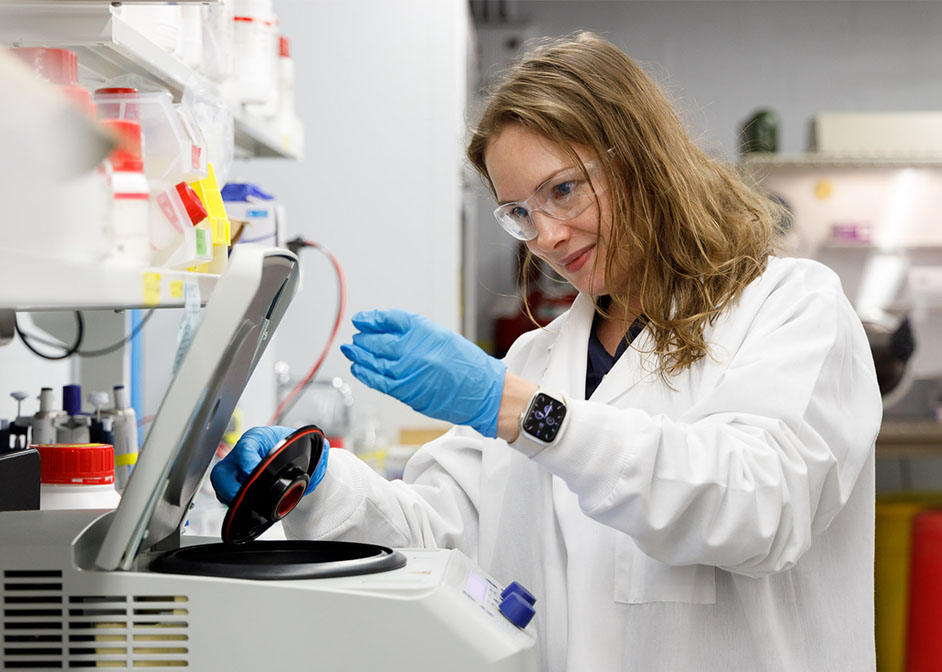Award From Leading Forum Recognizes a Top Contributor in the Study of Trace Metals in the Gastrointestinal Tract
2023 has been a busy and rewarding year for Melissa Zastrow.
The assistant professor of chemistry at the University of Houston will be honored with the 2023 Paul Saltman Memorial Award in Bioinorganic Chemistry at the 2024 Metals in Biology Gordon Research Conference in January. The conference is regarded as the top forum for research in bioinorganic chemistry.

The award is named for Saltman, who is known for his contributions to nutritional science, particularly the nutritional role of trace metals such as iron, copper, zinc and manganese.
The award recognizes Zastrow for her work on how metals affect the human gastrointestinal tract. As the 2023 recipient, Zastrow will present a lecture on her research.
Each year, the award is given to an assistant professor who has made outstanding contributions to the field of bioinorganic chemistry, particularly with research into how organisms acquire and use metals in biological processes.
Building a Reputation in Research
There is no application process for the Saltman Award. Instead, consideration is based on a researcher’s reputation in the scientific community.
“I started attending conferences back when I was a graduate student as a way to learn about the latest metals in biology research and to get my name out and my work recognized,” she said.
Over her career, Zastrow has continued to present her research at conferences and seminars and has successfully received numerous research grants.
Earlier this year, Zastrow earned a CAREER Award from the National Science Foundation (NSF), as well as a $300,000 grant from the Welch Foundation. In 2020, she received a $1.9 million grant from the National Institute of General Medical Sciences, which is part of the National Institutes of Health.
Understanding the Small Intestine
Zastrow, who joined the Department of Chemistry at the UH College of Natural Sciences and Mathematics in 2017, is focused on studying how inorganic chemistry in the small intestine affects health, and specifically, she aims to uncover the molecular mechanisms of how metals affect the gut microbiota.
“We’ve been doing that by making fluorescent sensors as part of my National Institutes of Health grant,” she said. Her work in this area is centered on making tools to detect changes in levels of metals in the gastrointestinal tract.
Creating Increased Awareness and Improved Gastrointestinal Treatments
Zastrow and her team are also investigating how changes in metals both inside and outside of bacterial cells affect gut bacteria. Different bacteria can have distinct uptake and efflux mechanisms for adapting to metal fluctuations that may impact their ability to live in the gut. On the other hand, metals that stay outside of cells and bind with the surface of bacteria can impact their interactions with the human host.
Her work in these areas focuses on how calcium, iron and zinc play a role in shaping the human gastrointestinal microbiota. Funding for this research is made possible through Zastrow’s NSF CAREER Award and Welch Foundation grant.
Through her work, Zastrow is striving to increase awareness about the roles of dietary metal nutrients in gastrointestinal processes and in human health.
“I hope this work results in improved treatments for gastrointestinal diseases and infection,” said Zastrow.
Winning the award will mean more visibility for Zastrow and her work.
“I look forward to more collaborations and more ways to share my research,” said Zastrow. “This will help to propel my research.”
Additionally, Zastrow hopes the spotlight on her work will compel others to join her field.
“We have a lot to do. Extra hands would help us go further in our research,” she said.
- Chris Guillory, College of Natural Sciences and Mathematics